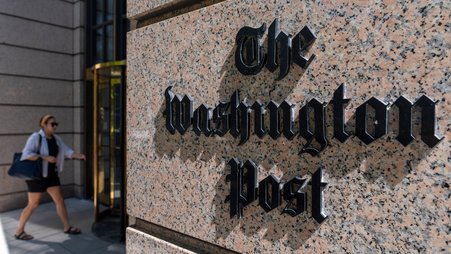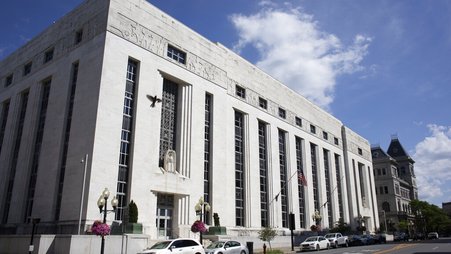When The Associated Press didn’t bow to President Donald Trump’s demand to refer to the Gulf of Mexico solely as the “Gulf of America,” he barred the news service from events in the Oval Office and on Air Force One. And when a judge determined that Trump’s decision to do so was unconstitutional, he spiked the permanent press pool slot for wire services entirely.
These decisions to shun newsrooms may sound like the product of a tantrum — and they are — but there is also a pattern at play: Trump is testing the limits of the First Amendment.
This (un)constitutional experiment started in his first term, when he revoked the credentials of individual journalists he disliked. One of them was Brian Karem, a former White House correspondent who covered Trump for Playboy.
Karem spoke about that experience and today’s press restrictions in a webinar hosted by Freedom of the Press Foundation (FPF) on April 16, 2025. He was joined by Caitlin Vogus, senior adviser at FPF, and Stephanie Sugars, who regularly reports on issues of press access to the White House as senior reporter for the U.S. Press Freedom Tracker, a project of FPF.
Karem, who successfully sued the Trump administration three separate times to get his press pass reinstated, emphasized that Trump’s denial of access to the AP is also a broader attack on wire services like Reuters and Bloomberg. Cash-strapped local newsrooms often rely on wire reporting to fill pages and inform readers, which is much harder to do when those services are sidelined.
“The whole point of this is to limit those who will ask questions that Donald Trump doesn’t want to answer,” Karem said during the webinar. “The effect, of course, for people across the country, is a slanted view of the news.”
In cherry-picking who can cover him, Trump is restricting access to the White House to only those willing to stoop to his demands, Sugars said.
“It’s alarming when you see all of these things in conjunction with each other and just how effectively this administration is taking steps to ensure that the only message that is getting out is one that they approve of,” she said.
The consequences are grave, including less-experienced journalists in the press room and fewer outlets reporting on the administration with the required scrutiny, Karem said. That enables Trump to hide more from the American public, which is therefore less equipped to hold him accountable.
“Donald Trump is asking, ‘Who are you with? What company are you with?’ because he wants to know so he can come back and say, ‘Oh, I like you.’” Karem said. “He has turned himself into a dictator with sycophants asking him questions.”
Trump’s effort to exert control over the press extends to major networks, too, Sugars said. Brendan Carr, chair of the Federal Communications Commission, has opened investigations into outlets including NPR, PBS, CBS, ABC, and NBC, and the Trump administration recently gutted the U.S. Agency for Global Media, which oversees Voice of America.
“It’s been a bit of an onslaught and coming from a lot of different angles, from within the White House, the Trump administration, and his allies more generally in Congress,” Sugars said.
While Trump is the most vocal anti-press president in recent memory, Karem said he isn’t the first to retaliate against journalists and their sources. He noted that Barack Obama used the Espionage Act nearly a dozen times to target whistleblowers.
“I have covered every president since Ronald Reagan. Every one of them has been complicit and guilty about destroying the First Amendment, free speech, and destroying our ability to use confidential sources,” Karem said. “Donald Trump is merely a symptom of the problem.”
Restriction and intimidation aren’t excuses for the press to throw in the towel. Karem said that newsrooms must find other ways to retrieve vetted factual information, which he described as “the coin of the realm.”
If they can’t access a press briefing or pool reporting seat, reporters can still focus on sourcing, building deeper relationships with those on their beats, and gathering information from people and places where restrictions don’t apply, Karem said.
“You’ve got to stand up to a bully,” he added. “There is nothing that is more antithetical to the idea of free press, free speech, and speaking truth to power than the moves that Donald Trump has made in his second administration.”





